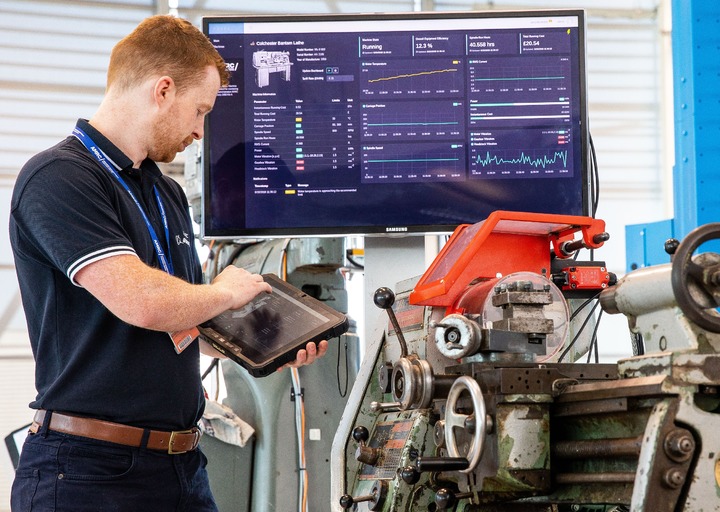The big ideas of the Fourth Industrial Revolution not just for the big players
16 January 2019Tinsley Bridge has always been a company which stays at the very forefront of manufacturing innovation, so it is no surprise that it has now embarked upon a project which will demonstrate that Artificial Intelligence (AI) and machine learning are valuable tools to improve manufacturing productivity; not only for industry’s big players, but for SMEs as well.
The company has joined forces with the engineers at the University of Sheffield Advanced Manufacturing Research Centre’s Factory 2050, who are using AI to learn what machine utilisation looks like on the workshop floor of the Sheffield-based award winning SME; which specialises in large-scale engineering for challenging environments.
The aim is to create a demonstrator, to show other SMEs in the Sheffield City Region, just how accessible Industry 4.0 technologies are, and how they can potentially revolutionise shop-floor productivity.
The demonstrator will be the first created under an emerging AI strategy being produced at Factory 2050, which seeks to harness the innovative work being done with AI and machine learning techniques across the AMRC and provide real use-cases for these techniques in industrial environments.
“Using edge computing devices retrofitted to the company’s CNC machines, we have collected power consumption data during the production of automotive suspension components,” said Rikki Coles, AI Project Engineer for the AMRC’s Integrated Manufacturing Group at Factory 2050. “It isn’t a complicated parameter to measure on a CNC machine, but using AI and machine learning, we can actually do a lot with such simple data.”
Data from the edge computing devices at Tinsley Bridge was sent to the AMRC’s cloud computing services, and using the latest data science techniques, ran through an AI algorithm to provide new insights for the control and monitoring of manufacturing processes.
Analysing the power signatures from the data, the algorithm looked for repeating patterns or anomalies, working out how many components were machined and deduced that three different types of components were manufactured.
Rikki said: “The project demonstrates to industry that with a low cost device collating quite simple data, AI and machine learning can be used to create valuable insights from this data for the manufacturer.”
Director of Engineering at Tinsley Bridge, Russell Crow, said: “Interrogating our machine utilisation rates means we have better visibility of what was being manufactured and when, and the ability to assess if we are scheduling effectively. This data will allow us to look at boosting our productivity on the shop floor.”
“Rather than investing in significant cost and time for new digitally integrated smart machining centres, we were able to work with the AMRC to retrofit our existing capabilities to achieve the same results and enhance what data we were collecting by fitting a simple current clamp to our machines; an unobtrusive solution that caused no disruption or downtime.”
Aiden Lockwood, Chief Enterprise Architect for the AMRC Group said the project demonstrator will show other SMEs how easily and cheaply Industry 4.0 technologies can be accessed:
“Traditionally these tools were built into commercial packages which could be out of the reach for some SMEs, so there is a misunderstanding that Industry 4.0 manufacturing techniques are for the big players who handle incredibly complex data collected over a long period of time.
“But AI is evolving and these techniques now give smaller businesses the ability to do so much more with their data. In this project we are using a simple data set, collected over a short period of time to provide real benefits for the company.”
Aiden said the AMRC want to show what using AI in manufacturing looks like for small businesses:
“The formation of our AI strategy will allow us to lead the way in developing new capabilities and bringing the academic, tech and business communities of the region together to educate and demonstrate AI technologies for manufacturing industries; learning from developments in retail, finance and marketing.”
The next phase of the project will see the engineers at the AMRC train the system further so the algorithm can detect non-conforming components whilst in production, or identify a problem when a machine is requiring intervention, such as inconsistent tool wear which affects component quality.
“Alongside the power consumption data, the plan is to feed the algorithm with available data about which of the manufactured components were non-conforming. So as well as providing clarity around machine utilisation, the algorithm will essentially learn what a ‘good’ manufacturing process looks like and be able to actively monitor on-going manufacturing processes,” said Rikki.
Russell said: “We started out with the aim to find out about retrofitting our machines for data capture, to give us an idea of our machine utilisation to optimise our production schedules. But as the project moves forward, we expect to gain even more visibility around our production processes so we can begin to move towards a predictive maintenance model on our machining shop floor which will provide improvements in quality and process capability.
“The insights the AI will provide will allow us to identify when our machines will require intervention for tool changes, or how long we can run them without intervention. Predicting tool failure and prolonging tool life will also affect our right first time rates, reducing non-confirming parts and boosting productivity.
“In the future the insights into our data will allow us to run our machines more effectively, so we can free time for our engineers to work on value-added tasks such as programming for multiple jobs or machines, creating a smarter factory that will help us manufacture technically advanced products.”
For media enquiries contact Rebecca Ferguson, AMRC Senior Communications Officer on 0114 222 6662 or at r.ferguson@amrc.co.uk.


